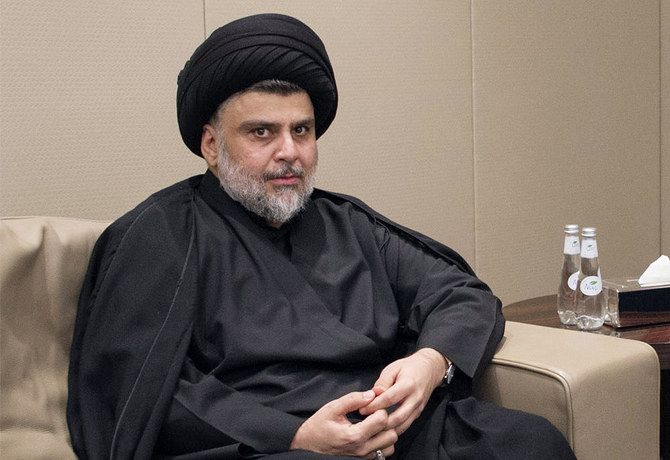Iraq’s populist Shiite leader Moqtada Sadr on Friday reversed his decision to boycott the October elections and said his movement would take part in order to help “end corruption.”
A firebrand with millions of followers and in command of paramilitary groups, Sadr is a crucial player in Iraqi politics who has often protested against the influence of both the US and Iran.
Sadr had said in mid-July that he would not participate in the Oct. 10 parliamentary election and would withdraw support from “anyone who claims they belong to us in this current and upcoming government.”
He reversed that position on Friday, saying he had received pledges from “certain” political leaders to reform the country and “put an end to corruption.”
Taking part in the elections is “now acceptable,” he said during a televised address, flanked by dozens of officials from his Sadrist movement.
Sadr, whose political maneuvers have at times puzzled observers, in February had said he backed early elections overseen by the UN.
Militias loyal to Sadr fought the US-led occupation of Iraq and he retains a devoted following among the country’s Shiite population, including in the poor Baghdad district of Sadr City.
The son of a revered religious figure, Sadr wears a black turban.
The parliamentary vote is set to be held under a new electoral law that reduces the size of constituencies and eliminates list-based voting in favor of votes for individual candidates.
Prime Minister Mustafa Al-Kadhimi, who came to power in May last year after months of unprecedented mass protests against a ruling class seen as corrupt, inept and subordinate to Tehran, had called the early vote in response to demands by pro-democracy activists.
Sadr’s supporters have been expected to make major gains under the new electoral system.
His Saeroon bloc is currently the largest in parliament, with 54 out of 329 seats.
Plagued by endemic corruption, poor services, dilapidated infrastructure and unemployment, Iraq is facing a deep financial crisis compounded by lower oil prices and the COVID-19 pandemic.
Sadr has appeared under pressure in recent weeks, with pro-Iran groups and individuals attacking him on social media and accusing him of responsibility for Iraq’s recent woes, including electricity shortages and two deadly hospital fires.
Meanwhile, Iranian Foreign Minister Hossein Amir-Abdollahian left for Iraq Friday to participate in a regional summit, the ministry said.
Foreign Ministry spokesman Saeed Khatibzadeh announced the departure to the “meeting to support Iraq” in a short statement.
The Islamic republic’s new President Ebrahim Raisi has also been invited to the Baghdad summit, but it is not clear if he will attend.
The Saturday meeting seeks to give Iraq a “unifying role” to tackle the crises shaking the region, according to sources close to Al-Kadhimi.
Egyptian President Abdel Fattah El-Sisi and Jordan’s King Abdullah have said they will attend, as has French President Emmanuel Macron, the only official expected from outside the region.
Iraq is seeking to establish itself as a mediator between Arab countries and Iran.
Raisi, who took office last week, has made improving relations with regional countries one of his priorities.

